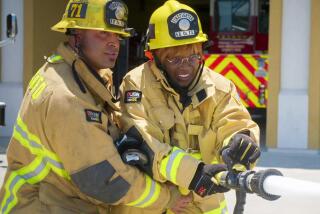NEW NETWORK POLICIES ON CONDOM ADS
- Share via
In a major policy shift involving condoms as an AIDS preventative, all three major TV networks moved Thursday toward getting the subject on the air in the form of advertisements or public-service announcements.
--CBS announced that the four TV stations it owns, along with its radio stations, can broadcast condom commercials, but said that the final decision was up to the individual stations. Both KCBS Channel 2 in Los Angeles and WCBS-TV in New York immediately said they would broadcast the ads.
--NBC, insisting that it has been the network’s policy for some time to allow its five owned-stations to make their own decisions, said that WNBC in New York had decided to air the condom ads. In Los Angeles, KNBC Channel 4, noting that they were told “some time ago” that they had the option to air condom ads, said the matter was “currently under consideration by KNBC’s management team.”
(Two weeks ago, an NBC spokeswoman had said the owned-stations were “bound by network policy,” which prohibits the broadcast of condom commercials.)
--ABC agreed to air 30-second public-service announcements, beginning March 2, that quote Surgeon General C. Everett Koop saying that “the best protection against the (AIDS) infection right now, barring abstinence, is the use of a condom. A condom should be used during sexual relations from start to finish with anyone who you are not absolutely sure is free of the AIDS virus.”
An ABC spokesman pointed out that the network had not lifted its long-standing ban on airing condom commercials, but that the company’s eight television stations (along with other network affiliates) have had the right to make their own decisions on whether to air condom ads. Officials at KABC-TV Channel 7 in Los Angeles have said the matter is under review.
Both CBS and NBC emphasized that their condom policy does not apply throughout the network chain. As CBS spokesman George Schweitzer said, affiliated stations fall into three categories, with “the largest number saying that if we play condom commercials, they will block them.” He said about 10 CBS affiliates across the country now air condom commercials; the rest are undecided.
Altogether, several dozen TV stations across the country have either aired or said they would air appropriate ads. These include stations in four broadcast chains--Knight-Ridder Broadcasting, Scripps Howard Broadcasting, Post Newsweek Stations Inc. and McGraw-Hill Broadcasting Co.
As the condom-ad issue developed under the specter of the AIDS crisis, both CBS and NBC maintained that airing condom commercials would offend the “moral and religious” beliefs of many viewers, while ABC said it was “inappropriate for a significant portion of our viewers.”
Pressure to air condom ads mounted Feb. 10 when Koop, appearing before a House subcommittee in Washington, called upon the networks to permit them, saying they were “necessary” and would have “a positive public-health benefit.” That testimony, coming from the surgeon general, who is a Reagan Administration appointee, carried considerable weight.
Tom Van Amburg, vice president and general manager of KCBS-TV Channel 2, said it was the AIDS epidemic that persuaded the CBS-owned station to accept condom commercials. “In evaluating the issue and our viewers’ strong feelings both for and against it, the bottom line always returned to the urgent need to help save lives in our community,” he said.
The station said that all such commercials submitted for broadcast will be evaluated for “content and taste according to CBS advertising standards. Those accepted will be scheduled in the late-night time period (after 11 p.m.), which is geared toward the adult viewer.”
Similar health concerns were expressed by other station executives.
Roger Colloff, vice president and general manager of KCBS’ sister station in New York, WCBS: “Five thousand New Yorkers already have died of AIDS and 30,000 are likely to die of the disease by 1991. We recognize that condom advertising affects a sensitive area of human behavior as well as strongly held moral and religious beliefs. However, we also recognize that New York has almost one-third of all AIDS cases in the United States.”
Bud Carey, vice president and general manager of WNBC, said, “We feel it is encumbent upon us to expand our efforts on this subject. We realize that members of our audience may not readily accept this action.”
WCBS said it would air “only those commericals whose principal message relates use of condoms to prevention of disease,” while WNBC said that the ads it accepts “must be solely directed to the issue of condoms for the purpose of reducing the risk of AIDS and not for either contraceptive purposes or for the purpose of encouraging sexual activity.”
WCBS said the commercials would run after 11:30 p.m.; WNBC designated 11 p.m. as its starting point.
In announcing its decision to accept a public-service ad about condoms, Alfred R. Schneider, vice president for policy and standards for Capital Cities/ABC Inc. said, “As broadcasters and concerned citizens, we cannot fail to recognize the special responsibility which the AIDS problem may impose upon communicators. We hope that broadcasting this important message will help make viewers aware of an important public-health issue.”
The American Foundation for AIDS Research developed the 30-second announcement in cooperation with ABC. The spot featuring the surgeon general will air regularly throughout the network schedule.
Meanwhile, Fox Broadcasting Co. said that it was not impressed by the ABC and CBS announcements. “Being the first major network to commit to the ads for the sake of media attention has no bearing on our decision,” said a Fox spokesman. “We consider this a serious and sensitive issue and we are discussing it with our affiliates to see if there is a consensus of opinion.”
More to Read
The biggest entertainment stories
Get our big stories about Hollywood, film, television, music, arts, culture and more right in your inbox as soon as they publish.
You may occasionally receive promotional content from the Los Angeles Times.










